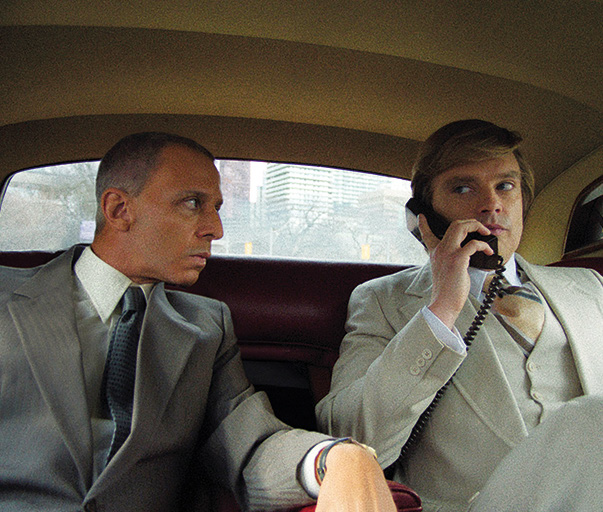
It was love at first sight. Not between Donald Trump (Sebastian Stan) and Ivana (Maria Bakalova), but between Donald and Roy Cohn (Jeremy Strong).
Director Ali Abbasi tries to take a measured approach in portraying such a historic and polarizing figure in American history. Abbasi inquires from the get-go whether Trump is a hereditary villain, born to be who he is now, or if he is merely a manufactured product of his environment. While this impetus gets obfuscated by the film’s later events, it is one that shows a desire to play no sides. The Apprentice opens with a montage that inserts shots of Trump juxtaposed alongside those of a destitute and decaying New York City in the late 1970s. Visual language like this is key for Abbasi to straddle the line of being unbiased but still critical. And when he shows Trump and Cohn locking eyes, it becomes clear that this is the inflection point that sends the former down a trajectory of megalomaniacal mayhem.
Trump is introduced as a shell of his future self. He is essentially his father Fred’s (Martin Donovan) landlord for their segregated housing complex with the shamelessness to demand rent from an old lady but with low enough self-esteem to be scared of getting too close to her. Trump is at least willing to meet people on their level at this point, but things change after he meets Cohn and gets seduced into seeing the delusions of grandeur.
Although a prescient and true event for what was to come with his attacks on the Central Park Five and spearheading the Barack Obama ‘birtherism’ claims, it is this unabashedly blatant discrimination that initially puts young Trump in the spotlight. But, Trump argues, it is not malicious because he is actually allowing Black residents to live in his apartment complex, just at a five-fold markup compared to white residents. With this, Trump is already on to one of the main three lessons that Cohn teaches him and that he eventually appropriates for himself once Cohn is no longer alive to challenge him: never admit guilt and always proclaim victory.
The film itself is an interesting endeavor. Most audience members are going to have some preordained attitude toward Trump and are not seeing The Apprentice to help solidify or inform their opinions. Therefore, Abbasi presents Trump the caricature without real introduction as would be standard in a historical biopic, but he tries to outline a new way of looking at Trump the human. Stan hits all the facets of a Trump caricature: the grandiose speech at all times, the hand gestures, the pursing lips; all of which risk the chance of taking the audience out of the story and back into their real lives, where the man is ubiquitous. Strong, on the other hand, is practically stone-faced and unblinkingly cold throughout the entire film. He has more room to play with his portrayal because of the unevenness of the historic duo’s contemporary relevance.
When real-life Trump threatened to sue Abbasi to prevent the film from earning a major distribution deal, many expected the film to be a staunchly progressive work of criticism, but instead we are challenged with the somber and harrowing origin story of a man who is a well-known finished product today. Still, at the same time that Trump (in the film) is under the influence of his surroundings, from the coerciveness of Cohn to the neglect and implicit abusiveness of his father Fred, he is ultimately choosing his own fate and takes pride in it. And sometimes it is unclear whether Abbasi wants us to morally compromise Trump the man, who is a wannabe socialite with extreme self-consciousness and faux elite status, with Trump the monster, who tosses Cohn to the curb after finding out he has AIDS.
The Apprentice ends with what is essentially Trump as Frankenstein’s monster, getting a hair transplant and liposuction to refine himself into America’s human embodiment of late-stage capitalism, where you can buy your way to becoming the person you desire to be. Unfortunately, the film leaves a lot of questions on who Dr. Frankenstein is in this case. Is it Cohn’s deviousness? Is it his father and his callousness? Is it his brother and his failures? Or has it been Trump who has been calling the shots all along and was just waiting for a juicy vessel to attach to like a leech and derive the sustenance needed for himself and no one else? And regardless, how does one love this man for him and not his image? Now that we know that Trump is returning to the White House for a second nonconsecutive term, these questions feel more relevant than ever, but the answers still feel far out of reach.
















